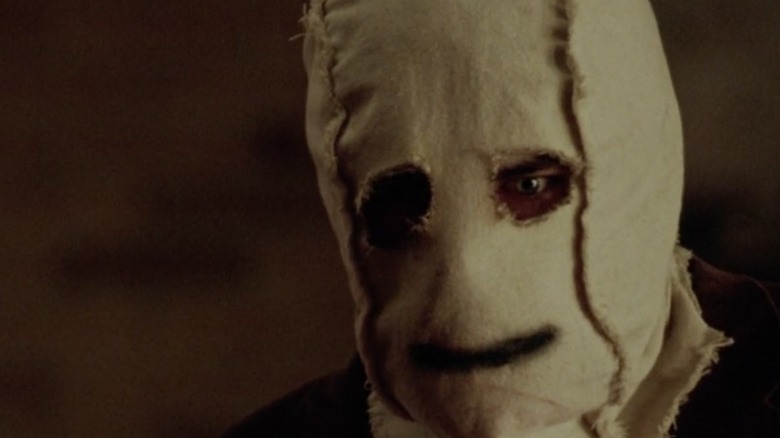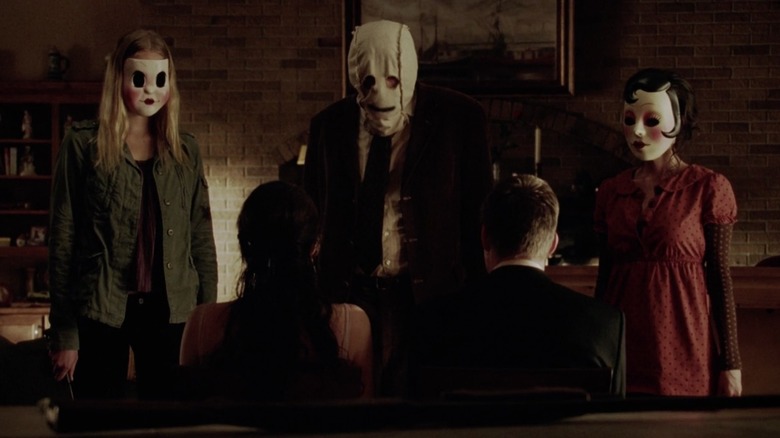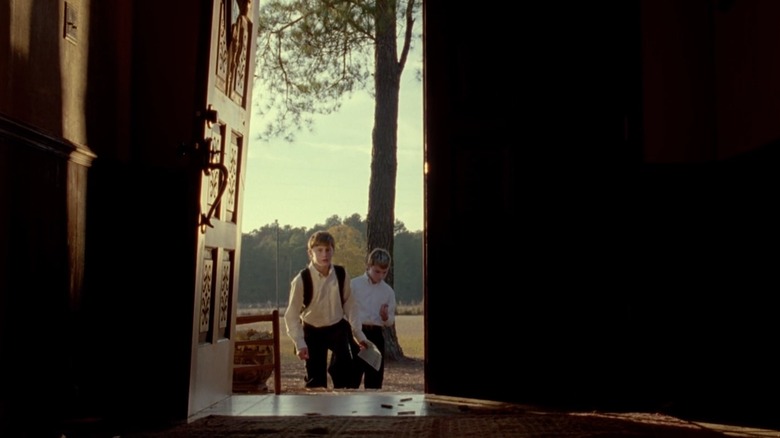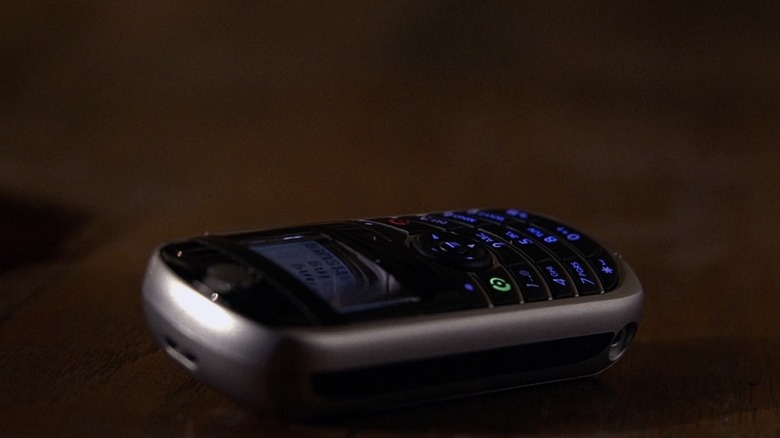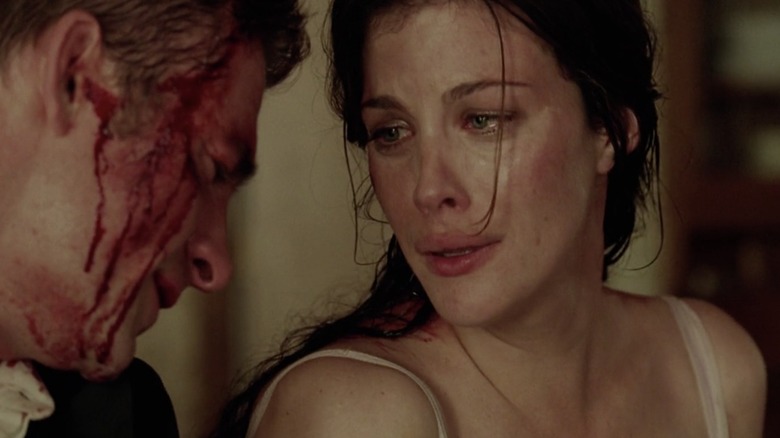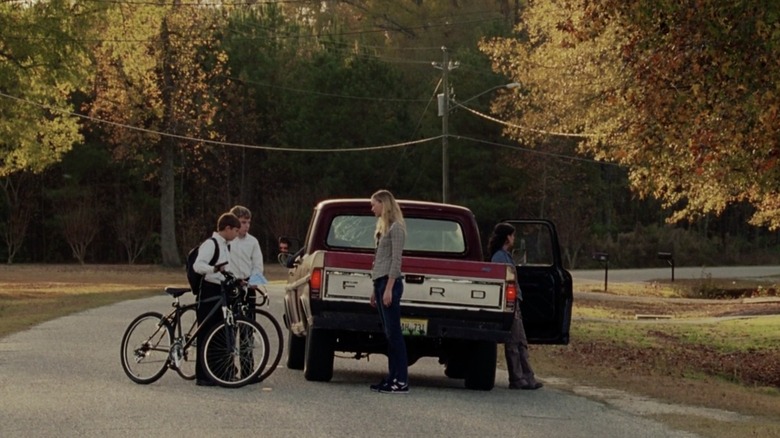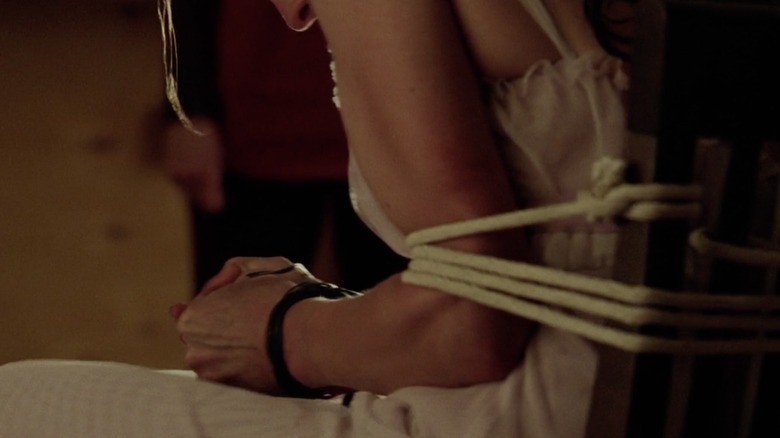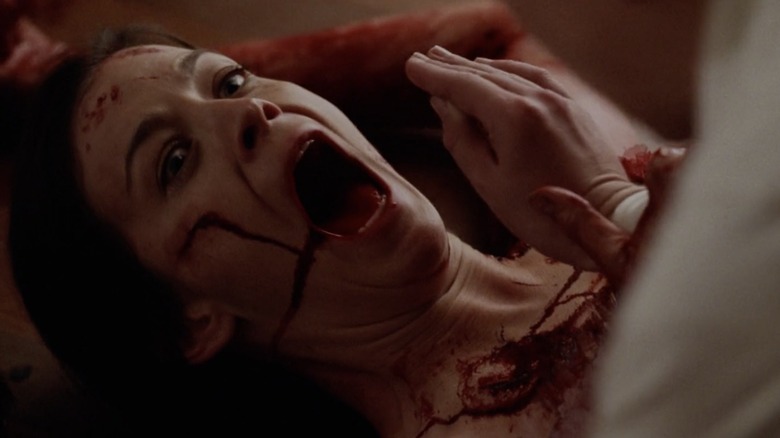The Ending Of The Strangers Explained
Ah, the home invasion genre. Undoubtedly one of the most chilling variations of the horror genre, precisely because of its realism. Reanimated corpses and blood-sucking immortals are the stuff of fiction. But when it comes to random acts of violence, the boogeyman is all-too real.
2008's "The Strangers" depicted an unnerving story, one framed around a hair-raisingly plausible scenario (that is, actually, inspired by a real-life situation). After retreating to a secluded home after a wedding reception, a couple — Kristen (Liv Tyler) and James (Scott Speedman) — are terrorized by three masked strangers. As the night unfolds, the anonymous assailants cut off the couple's ties to the outside world and make their lives a waking nightmare. It's the sort of scenario that can keep you up at night: An incident that may be understood later, but in the moment, feels like a completely random attack.
The film, which marked the feature film debut of writer-director Bryan Bertino, was met with a middling critical response. The movie-going public, however, couldn't get enough. "The Strangers" ultimately grossed $82.4 million on a $9 million budget, becoming a sleeper hit and spawning a sequel.
Some degree of the film's success was due to its brutal conclusion: A bleak affair, with no easy answers and a decidedly nihilistic attitude towards unmotivated violence. So, check your windows and lock your doors, and let's break down the ending of "The Strangers."
Why are you doing this?
Kristen and James ride in uncomfortable silence. It's a cool night in February, and the pair are making their way from a friend's wedding reception to James' summer home. James was so sure that Kristen was going to accept his marriage proposal. Kristen's tear-stained face says it all: Where do they go from here? The two listlessly wander about the house, ignoring the rose petals and trying to come to terms with the new, uncomfortable state of things. But, their bad night is about to get a hell of a lot worse.
There's a knock on the door. A blonde woman, bathed in shadow, asks for Tamara. After an awkward exchange, they send her on her way. James attempts to gather his thoughts and leaves on a night drive. Kristen puts on a record and examines her would-be engagement ring. Then, suddenly, another knock. Well, less of a knock than a banging. Kristen grabs a knife and starts charging her phone. The landline is dead and she can't shake the feeling that someone is in the house.
So begins "The Strangers," which barrels forward with nihilistic ferocity pitting the emotionally strained couple against three masked assailants. James returns to find Kristen a mess, and he soon finds out why. Together they attempt to survive in their own home, defend themselves, and call for help, all to no avail. These are everyday people with no survival skills; responding on impulse in a desperate bid to survive.
At the end of their terrifying night, James is missing and Kristen is badly injured. Her attempts to signal for help from a remote radio were a bust, upon returning to the house the power cuts out. Limping and surrounded by the masked intruders, Kristen attempts to find James only to be knocked out by the towering male in the group. She awakes tied to a chair next to James, distraught and defeated with one searing question: why?
The daylight brings no safety
Kristen wakes up to the sound of Pin-Up Girl opening the drapes. Warm sunlight floods the room. It's a beautiful day; early birds chirping and not a cloud in the sky. Kristen grunts against her taught restraints, kicking and whimpering as her three masked assailants stand silently over her and the defeated James. We tend to expect horrific things to take place under the cover of darkness; to slink, creep, and strike while we're sleepy, vulnerable, and alone.
Evolutionary psychologists have theorized that our fear of the dark lingers from the days when human beings weren't at the top of the food chain and nocturnal predators were a real threat. Horror films take advantage of our instinctual fear of the dark; allowing our imaginations to run wild and conjure up worst-case scenarios in the darkest recesses of our minds.
In genre cinema, horrific things tend to lurk in the shadows (darkness does a cheap rubber monster good, after all). That said, there's no shortage of horror film baddies that trudge brazenly through the light. The man-eating shark in "Jaws" didn't confine its reign of terror to the shadows and neither do the titular trio of "The Strangers." And this is precisely what makes the climax of their random murderous assault so disturbing.
They open the curtains before killing Kristen and James, unafraid and unconcerned with the possibility that some prying neighbor might see. The fact that "The Strangers" ends bathed in sunlight is both unexpected and terrifying; further cementing the film's core theme that random acts of violence are exactly that. Random. Daybreak offers Kristen and James no solace or relief. This isn't the kind of evil that is miraculously banished by the sun. And that's an absolutely terrifying thought: that something as invasive and violent as this could unfold in broad daylight.
Wait a minute, whose cell phone is that?
There are few glimmers of hope in "The Strangers." One of them is when Mike (Glenn Howerton) arrives at the house in response to James' upset voice message.
Mike's a good pal. His friend's marriage proposal fell through and here he is at god knows what hour to pick up the pieces. Unfortunately, Mike's good intentions lead to his demise. Waltzing into the house oblivious of the situation, he's shot in the face by James' itchy trigger finger.
To be fair, when a person blows their best friend's face off, the first reaction isn't typically to steal his cell phone. Even as an audience member, in the flurry of bullets and tears, it's easy to forget that Mike has a phone that could be Kristen and James' chance to hail the police. So it seems plausible that the possibility of Mike having a phone didn't enter James' mind. After the incident, he bravely announces that he's going to "try and call for help" — not by checking his dead friend's pockets — but by venturing out for the two-way radio in the woods.
To be fair, the movie wants us to forget that Mike has a cell phone for dramatic reasons. Namely, because this literal lifeline makes a dramatic appearance in the final act. Bleeding out on the floor, Kristen hears a phone ring. We cut directly to a close-up of the device lying on the ground, plain as day. Because of this sudden introduction and its earlier dismissal, you'd be forgiven for wondering where the heck this extremely important phone came from. Well, you have Mike to thank: a helping (if ineffective) hand in death, as he was in life.
The lack of twist or grand reveal is precisely why it's so terrifying
Upon coming-to, lashed to a chair, Kristen breathlessly asks the trio what we've all been wondering: "Why are you doing this to us?" After a pause, Dollface responds: "Because you were home." This attack has nothing to do with Kristen and James' relationship struggles, with the apparent wealth of James' family, or with any sinister occult purpose. They answered the door. It's just that random and simple.
Indeed, the scariest thing about "The Strangers" isn't the masks, the jump scares, or the bloodshed. Instead, the film offers a glimpse into the terrifying notion that sometimes bad things happen ... just because. There's no catharsis, and no explanation for our villains' actions. When the assailants remove their masks, Kristen and James don't recognize their faces. There is no "ah-ha!" moment. The killers are, as the film's title suggests, just strangers.
This thesis hits especially hard in these final moments — even at the film's end, there are no answers. All we're left with is pure dread. Because we know so little about these anonymous boogeymen, they are able to remain just that: Something that can go bump in the night without any warning or purpose. The conclusion of "The Strangers" isn't here to satisfy your curiosity. It's here to hammer home the uncomfortable reality that cruelty exists in the world without a motive.
Were the killings an initiation for Dollface?
Satisfied with the damage they've inflicted, our now unmasked trio exit James' summer house and pile into their Ford pickup. Their truck passes two Mormon boys, walking their bikes on the side of the road. They stop and Dollface (Gemma Ward) asks for a pamphlet. "Are you a sinner?" one boy asks. "Sometimes," Dollface replies after some thought. The boy slowly hands her a pamphlet and Dollface returns to the pick up. As they drive away, Pin-Up remarks to Dollface that "it'll be easier next time."
As the ever-speculative denizens of Reddit have surmised, Pin-Up's comment may imply that the events we see in the film were an initiation rite of sorts for Dollface. Indeed, if you look at the trio's masks and their credited names, a sort of hierarchy emerges. Man in Mask (Kip Weeks) never speaks, a dominating presence who towers over his two smaller peers. Pin-Up Girl (Laura Margolis) always appears assured and well-practiced with a name suggesting a degree of maturity. Dollface, meanwhile, is another story; a weak voice beneath a wide-eyed childish mask. It's possible that she's new to this.
This interpretation potentially puts Pin-Up Girl's comment that it will be "easier" next time into context. Dollface's struggle with the acts she has committed is further implied by her interactions with the Mormon boys. She's a sinner, and she's a little shaken up by what she's just done. But next time, it won't be her first rodeo.
The skin-crawling similarities to real-life murders
The idea for "The Strangers" came from a number of different real-life sources. While you have to go digging through the film's bonus features and production notes to uncover how writer-director Bryan Bertino's own brush with home invasion inspired the film, the ending of "The Strangers" hammers home some of the film's more well-known sources.
As our unmasked trio pile into their pickup truck — a strange little family united by a desire to enact random acts of violence — the connective tissue to the Tate–LaBianca murders is unavoidable. As Bertino recounts in an interview on the now-defunct website Shock Till You Drop, the film was indeed in direct conversation with the murders enacted by the self-described "Manson Family." As Bertino describes, while a child he was heavily influenced by the 1974 Vincent Bugliosi/Curt Gentry book "Helter Skelter." The true-crime novel recounts a first-hand account of the cases associated with the Manson Family, including the notorious 1969 murders of Leno and Rosemary LaBianca, Sharon Tate, and several others. "None of the victims knew about the Manson family or why it was happening to them. So, I got really fascinated with telling the victims' tale," Bertino explains.
As Britt Hayes notes for Birth. Movies. Death., another source of inspiration is an incident known as the "Keddie Cabin Murders," an unsolved quadruple homicide that took place in a defunct Californian railroad town in 1981. One of the most unnerving similarities between "The Strangers" and the Keddie Cabin Murders takes place during the film's conclusion. With Kristen and James being bound to chairs in their living room and stabbed in the early morning, it bears a strong resemblance to the fates of some of the case's victims.
The final girl gets the final scare
Love 'em or hate 'em, jump scares are an essential part of horror films. While not all screamers, as they are sometimes called, are created equal, some are nobler than others.
"Stingers" describe the jump scares that give the audience one last jolt before the credits roll — and believe it or not, it's a time-honored tradition. There's the dream sequence at the end of "Carrie," for instance, where our titular witchy heroine's bloodied arm bursts out of her rocky grave to snatch the traumatized Sue. And who could forget the concluding shot of the fantastic found-footage film "[REC]," which sees Angela dragged off into the darkness, screaming in terror at a monstrosity she cannot see. From Jason's decomposing corpse springing out of the placid lake in the original "Friday the 13th" to Donald Sutherland's horrifying shriek at the end of the 1978 "Invasion of the Body Snatchers" remake, a final shocking scare is a totally acceptable (if a bit silly) way to end a horror film.
"The Strangers" keeps that tradition alive. As the two Mormon boys (who are going to need some serious therapy after this) venture into the house, they spy James and Kristen's mangled bodies and investigate. Hovering over Kristen, the boys take in the crime scene with a frankly eerie silence, dumbstruck perhaps at the gruesome bloodbath before them.
One boy hovers over Kristen's corpse, extending his hand towards her face (hey, maybe he was going to check her vitals, who knows?). Then: bam. Kristen comes to, screaming. Cut to black.
Considering the film's nihilistic gait, Kristen's survival is initially surprising. But upon closer inspection, the assailants leaving Kristen alive gives us some disturbing insight into the killers' psyche. They are not concerned with the act of killing, or even being caught. All that interests them is the violence — rhyme, reason, or consequence be damned.
